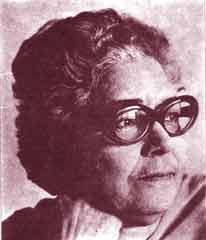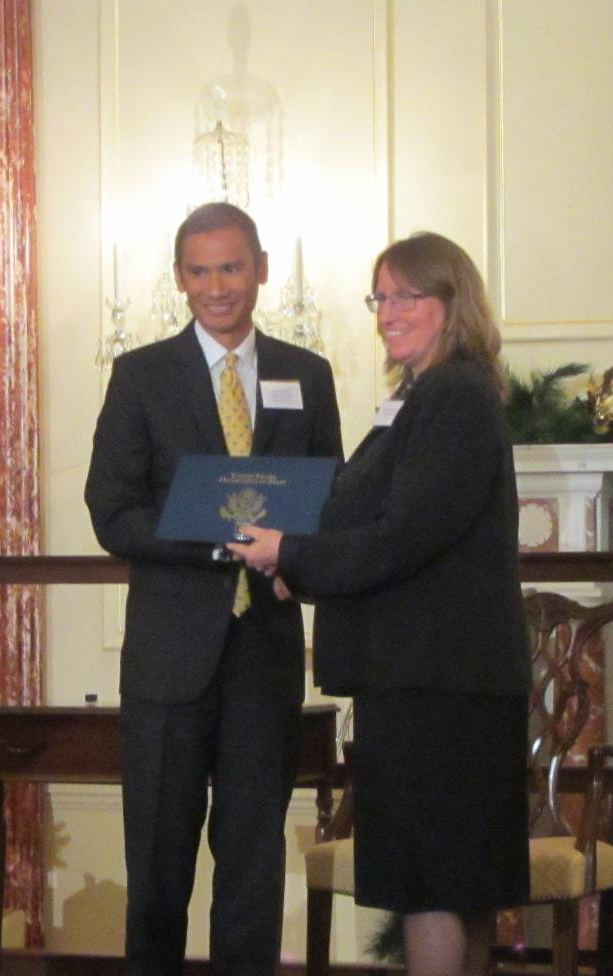Ismat Chughtai’s Lihaf: A Short Note

Suggested citation format:
Katyal, Akhil. 2013. Ismat Chughtai’s Lihaf: A Short Note. Orinam.net
Retrieved on month/dd/yyyy from https://orinam.net/ismat-chughtais-lihaf-a-short-note

In the November of 1946, summoned for the second hearing by the courts of the colonial Indian State on the charges of obscenity for her Urdu short-story Lihaf (‘The Quilt’), the writer Ismat Chughtai reaches Lahore. It had been about four years since Lihaf had been published in the Urdu journal Adab-e-Lateef. It told the story of Begum Jan who is married into a rich Muslim household where she begins to find pleasure in her housemaid Rabbu’s service – in her massages, in her recipes, in her touch. Narrated in the voice of an un-omniscient young girl, the story ends with a moment of radical speculation – what the young girl hears at night from the Begum’s bed, what she makes of Rabbu’s palpable presence there, what she sees under the Begum’s quilt. None of this is directly revealed in the story but instead, breathed into its air, nourishing a text with exciting inferences.
Yet Lihaf, now charged in court, was already a subject of some scandal and concern in Chughtai’s literary circles. She found herself explaining her motivations for writing the story to one older writer M. Aslam in Lahore. This motivation was propelled by a peculiar sort of confusion. In fact the confusion is key to this matter, to her writing the very story:
‘अस्ल में असलम साहब, मुझे कभी किसी ने नहीं बताया कि ‘लिहाफ़’ वाले मौज़ू पर लिखना गुनाह है। न मैनें किसी किताब में पढ़ा कि इस…मर्ज़…या लत के बारे में लिखना नहीं चाहिए। शायद मेरा दिमाग अब्दुररहमान चुगताई का ब्रश नहीं, एक सस्ता-सा कैमरा है; जो कुछ देखता है, खट से बटन दब जाता है और मेरा कलम मेरे हाथ में बेबस होता है’ (‘Actually Aslam Sahab, I was never told by anyone that I should not write on this particular subject of ‘Lihaf’. Neither did I read in any book that one should not write about this…illness [marz]…or…addiction [lat]. Maybe my mind is not the brush of Abdurrahman Chughtai, it is instead a cheap sort of camera, whatever it sees, it clicks, and my pen becomes helpless in my hand.’
The ellipses (‘इस…मर्ज़…या लत’) are Chughtai’s own, foregrounding the element of confusion – foregrounding the centrality of the confusion to what she is saying about the subject of her story. The citation is from her memoir Kaghazi hai Pairhan (1998). What is notable is that in the middle of 1940s, Chughtai is not able to choose a single frame for same-sex desire, for understanding the erotic relationships between women. What she does is more interesting for us. It launches a way of understanding same-sex desire in colonial India as always existing between different idioms, of ways of speaking it that are unable to reconcile its formal dimensions, its medical ideas and social attitudes, its university curricula and everyday habits. Chughtai’s inability to reconcile is also a form of her indifference to any need to do so.
Instead, Chughtai’s strategy, in her own words, is photographic. It clicks the picture, keeping all its meanings frontally available, always in a confusing proximity. She uses more than one frame, in the same – slightly halting – breath, to talk of ‘this particular subject of ‘Lihaf”. One is marz or illness. It is nearly soluble with ideas of ‘homosexuality’ partially formalized as a diseased condition. Within 20th century European and colonial discourses of institutional medicine and psychiatry, homosexuality is understood as such a ‘condition’ to be cured, to be dealt with. In fact, a little later in her defense with M. Aslam, Chughtai specifically refers to contemporary ‘नफ़सियात और डॉकटरों के कोर्स’ (‘psychology and medical curricula’). The history of same-sex desire as ‘marz’ is easily sighted in this real uncertainty of Hindi and Urdu writers of this time about whether to call this specific ‘subject’ a medical condition or an excessive habit. This confusion – that is essential and formative – is veritably persistent into more recent times.
Same sex desire as ‘marz’ had a substantial colonial context. Girindrasekhar Bose (1887-1953), the first president of the Indian Psychoanalytic Society (IPA) founded in 1922, who corresponded with Freud for over twenty years, led a group of intellectuals, doctors, college professors, psychologists and enthusiasts, both Indian and British, in 1920s-50s Calcutta among whom discussions of ‘homosexuality’, ‘masturbation’, ‘repression’, ‘oedipus complex’ or ‘female hysteria’ were commonplace. In 1927, the bulletin of the 10th annual conference of the International Psychoanalytic Association at Innsbruck in Austria, reported the activities of it sub-branch, the 6 year old IPA that used to run its meetings in 14 Parsibagan Lane in Calcutta, the house of its president. It said that on ‘February 5, 1926. The President [Girindrasekhar Bose] read a paper on the ‘Genesis of Homosexuality’’ at a meeting of the association in his house. It goes on to add that ‘many distinguished visitors and medical men attended the meeting and took part in the discussion’. This, it says, was apart from the ‘the usual Saturday evening discussions on various psycho-analytic topics’ that were held at his residence. Calcutta University, meanwhile, had already opened the country’s first Department of Psychology in 1915.
As Chughtai’s conversation with M. Aslam continues, he charges her with a lack of proper religious education that, he supposes, leads her to write of such subjects. Chughtai gives him a short trajectory of her successive encounters with knowledge about this ‘subject of Lihaf’. It is here that she cites that strong formal medical tradition accessible to her at the university libraries in late colonial India:
‘जब बचपन में मैंने ज्यादा किताबें पढीं तो मेरे दिल को धक्का सा लगा। वो बातें गंदी लगीं। फिर मैनें बी.ऐ. के बाद पढ़ा तो पता चला कि वो बातें गंदी नहीं, बड़ी समझ-बूझ कि बातें हैं जो हर ज़ी-होश इनसान को मालूम होनी चाहिए। वैसे लोग चाहें तो नफ़सियात और डॉकटरों के कोर्स में जो किताबें हैं उन्हें भी गंदा कह दें’ (‘When I read more and more books in my young age then I was shocked. Those things seemed dirty. But when I read about it after my B.A. then I came to know that these things are not obscene, they are in fact quite insightful and should be known by every reflective person. As it is, if people want they could call even those books on psychology and those in the doctors’ medical curricula obscene’)
During these B.A. days at the missionary institution Isabella Thoburn College in Lucknow, Ismat Chughtai had at her disposal a library full of literary and scientific texts from Europe and India. ‘आई.टी. कॉलेज में कई हज़ारों किताबें थीं’ (‘I.T. College had thousands of books’). It is here that her head began to swirl with the clash of different and contradictory systems of knowledge, including her confusion over how to reconcile the Darwinian theory of evolution with the Islamic-Christian theory of the divine genesis – ‘दिमाग कलाबाज़ियाँ खाने लगा’ (‘My head began to do acrobatics’). Later working as a school-teacher in Bareilly, Chughtai continues her ravenous and eclectic reading. She tells one friend about reading a lot of Freud, where she would have inevitably picked up on references to the word-concept of ‘homosexuality’. True to her doubleness of understanding, her reading of Freud was never blindly trusting but always critical and looking for loopholes and incompatibilities, even subjecting Freud’s name to a cheeky and hilarious pun. Talking of her experience of reading Freud, she states
‘…मुकम्मल ईमान न ला सकी । कुछ फ्रौड भी है फ्रायड में। एक कज है मेरे ज़ेहन में । कितना भी अज़ीम ईंटेलेक्चुअल हो, मैं आँख मूँदकर ईमान लाने कि कायल नहीं। न जाने क्या आदते-बद है कि सबसे पहले उनके कौल में लूपहोल तलाश करती हूँ। मुवाफ़िकत से पहली सारी मुखालिफ़त कि देख-रेख कर लेनी चाहिए…पहला लफ्ज़ मेरी जुबां से शायद ‘क्यूं’ हि निकला होगा, हालाँकि इस क्यों ने मुझे बड़ी मार खिलाई है’ (‘I could not bring complete faith to it. There is some fraud in Freud. My mind always has a nagging doubt. No matter how great an intellectual it is, I am never fond of giving blind trust. I don’t know what sort of habit it is that first I always search for loopholes in their work. Before compatibility we should always take stock of all the incompatibilities…may be the first word my mouth ever uttered was ‘why’, although this ‘why’ has landed me in a lot of trouble’)
Chughtai’s nagging doubts do not let same-sex desire be conceptualized simply, uncomplicatedly as marz. Her other frame, lat, is that of excessive habit, a sort of addiction that is not yet medicalized, that works precisely in the not yet of such medicalization. It is more squarely part of a long-standing Urdu word-concept of shauk or one’s personal inclinations. It is understood as being within an excessive but always familiar bandwidth of habits. Lat as that thing which one is given to, which is always of various kinds – for food, for games, for music, for prostitutes, for girls, for boys, for getting into arguments – and comes in less and more ordinary versions. Lat plies on sociable cultural habits or one’s own hobbies till they tease out of the bounds of what is deemed as mere duty. It moves beyond the mundane range of self-possession, either by remarkable talent or by exceptional surrender or both. It is set off when one becomes – for that moment – zealously attached to one’s own interests, either accomplishing them or giving in to them.
In the tenth chapter of her memoir ‘The Golden Spittoon,’ Ismat Chughtai talks of the twins, Munne Miyan and Pyare Miyan, who were enrolled with her brother Shameem at the Aligarh University. Contemporary social reformist and nationalist Hindi writers such as Pandey Bechan Sharma ‘Ugra’ would have seen these boys, I imagine, as symptomatic of the moral and physical waning thought to be brought about by fashion, cosmetics and luxury, quite useless to the project of building ideal men for fighting for and running the nation, for the training as the future ‘शासन के सूत्रधार,’ ‘the architects of governance’ for an independent Indian polity (Ugra 1928). Chughtai uses a Marathi word to describe their demeanor, fatkal, which implies someone ‘without control or composure’, close to the Hindi munhfat, ‘someone who speaks rather freely’. Within such a backdrop of degeneracy, finery and excess, Munne Miyan’s and Pyare Miyan’s lack of relish for women is a positively banal fact, if not actively constitutive of their persona. The world of lat here is a place-holder for same-sex desire:
‘[नवाब के] दो जुड़वाँ साहबज़ादे अलीगढ़ भेजे गए थे…उन लड़कों की सोहबत में नाच-गाने के जलसों में [शमीम] बड़ी पाबन्दी से शरीक होते…पढ़ने-लिखने का कोई प्रोग्राम न था. ये लड़के एक शानदार कोठी में अपने अमले के साथ बस हुल्लड़ मचाया करते थे। नवाब साहब ने जबरदस्त अतिया यूनीवर्सिटी को दिया था। मगर ये साहबज़ादे…जार्जेट के ज़रदोज़ी काम के कुरते, रेशमी, चुस्त पाजामे और कामदार जूते पहने क्लास में कभी ठुमकते आ जाते। उनके साथ साज़िंदे भी क्वाटर्स में रहते थे। रोज़ नाच-गाने का प्रोग्राम जमता। यूनीवर्सिटी के निकम्मे और चापलूसी में माहिर उनकी दरबारी पर तैनात रहते…जुड़वाँ साहबज़ादे कुछ फटकल [‘fatkal’] क़िस्म के थे। औरतों से कत्तई दिलचस्पी नहीं थी। खूब सजते और मेक-अप करते थे’ (‘[Nawab’s] twin heirs were sent to Aligarh…In the company of those boys [Shameem] used to regularly take part in the song and dance gatherings…there was no plan to study. These boys lived in a magnificent mansion with their staff and caused a lot of uproar all the time. Nawab Sahab had given a huge grant to the university. These spoiled ones…used to sometimes sway into the class wearing georgette kurtas with golden handiwork, silky hugging payjamas and stylish shoes. Their crew used to stay with them in their quarters. There they kept up daily routine of singing and dancing. All the fools and the sycophants of the university used to hang around their mansion…the twins were of the fatkal sort. They had no interest in women. They used to dress up a lot and apply a lot of make-up’)
The idea of excess in lat provided a crucible for various expressions of same-sex desire in colonial India, most notable of which is Ugra’s series of Hindi short-stories Chaklet (1924-7) in which the boys’ indulgence in same-sex affairs are plotted in an unmistakable continuum with their other playful addictions, such as for pan, sweets, cinema, music and dancing. This is close to the world of Begum Jan’s husband in Lihaf. Consider Chughtai’s prose when she describes him: ‘the Nawab who was of ‘ripe years’… very virtuous. No one had ever seen a nautch girl or prostitute in his house…He, however,’ – note the appearance of the idiom of habit for same-sex desire – ‘had a strange hobby. Some people are crazy enough to cultivate interests like breeding pigeons and watching cockfights. Nawab Saheb had contempt for such disgusting sports. He kept an open house for students—young, fair and slender-waisted boys whose expenses were borne by him.’ Nawab sahab had married Begum Jaan but, given as he is to other hobbies, had ‘tucked her away in the house with his other possessions’.
Finally, Chughtai does not reconcile the two frames of hobby and illness, lat and marz. She persists with both. She confuses both. What I find most interesting is precisely this place between these many idioms, in those ellipses of Chughtai’s, in her indecision. Her confusion is symptomatic of the rich doubleness of understanding same-sex desire in colonial India. Moreover, if there is a growing consensus on seeing the colony as a ‘laboratory of modernity’, not simply a site of exploitation, such as in Ann Laura Stoler’s redoubtable work on race and Foucault’s History of Sexuality, then we need to know what goes into such a lab experiment (1995). In Chugtai’s Lihaf and her own retrospective comments on it, one can see this late colonial experiment around same-sex desire in motion. She builds into her writing social registers that set this desire within the idea of habit, a language of excess, not different in kind from opposite-sex desire but in degree, and in a continuum with other kinds of excesses like music, prostitutes, cards or alcohol. And yet her idioms always have a distinct measure of solubility with other forms of knowledge, not least of colonial medicine, experimenting lat with marz, ‘homosexuality’ with ‘excess’. Every time we read Lihaf we rehearse this experiment.
This essay first appeared on the Writers Asylum blog in August 2013, and has been republished on Orinam with the author’s consent. It may not be reproduced in full or part on any online forum, magazine or journal without the author’s consent. Click here to read Orinam’s copyright policy, and here for inquiries.


![[story] Strangers and Unspoken Connections](https://orinam.net/wp-content/uploads/2023/11/Amalstory-1.jpeg)

The fact that pre-Christian and Christian notions of sex appear to draw from different conceptions of morality prompts us to question whether there was also a single understanding of love. Though in the late 19th century young men and women had relative freedom to choose partners we should not confuse this with the choice enshrined in modernist narratives of “romantic love”. Accounts at the beginning of the 20th century suggest that women could use izintando, or love potions, to attract a man and men could also use umuthi (medicine/potion) to hayiza a woman and induce her to love him. [24] These love potions might have had their origins in human desires but they worked through the spiritual world of amadlozi (ancestors). Consequently, unlike the individualistic love of the romantic love culture, they could not be so easily resisted through self control, a point well demonstrated by the involuntary screaming of a woman who was subjected to umhayizo. At the same time, similarities between the powerful consequences of love potions and the spontaneous emotion associated with romantic love should not be overlooked: both could “come from nowhere” and seize the heart of a man or a woman in a powerful manner.